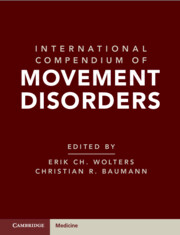Book contents
- International Compendium of Movement Disorders
- International Compendium of Movement Disorders
- Copyright page
- Contents
- Contributors
- International Compendium of Movement Disorders
- Hypo- and Hyperkinetic, Dyscoordinative and Otherwise Inappropriate Motor and Behavioral Movement Disorders
- Section 1: Basic Introduction
- Section 2: Hypokinetic Movement Disorders
- Chapter 12 Autonomic Dysfunction in Parkinson’s Disease
- Chapter 13 Neuropsychiatric Manifestations in Parkinson Disease
- Chapter 14 Sleep–Wake Disorders in Parkinson’s Disease
- Chapter 15 Neuronal Activity in the Basal Ganglia and Thalamus in Patients with Parkinson’s Disease
- Chapter 16 Pathology in Parkinson’s Disease
- Chapter 17 Diagnosis of Parkinson’s Disease
- Chapter 18 Prodromal Manifestations of Parkinson’s Disease
- Chapter 19 Biomarkers in Parkinson’s Disease
- Chapter 20 Physical Rehabilitation of Patients with Parkinson’s Disease
- Chapter 21 Regenerative Strategies for Parkinson’s Disease
- Chapter 22 Conventional Pharmacotherapy in Parkinson’s Disease
- Chapter 23 Continuous Dopaminergic Stimulation in Parkinson’s Disease
- Chapter 24 Pipeline of Pharmacotherapy in Parkinson’s Disease
- Chapter 25 Non-Invasive Brain Stimulation for the Treatment of Parkinson’s Disease
- Chapter 26 Deep Brain Stimulation in Parkinson’s Disease
- Chapter 27 Focused Ultrasound in Parkinson’s Disease
- Chapter 28 Dementia with Lewy Bodies
- Chapter 29 Genetic Parkinsonisms
- Chapter 30 Multiple System Atrophy
- Chapter 31 Progressive Supranuclear Palsy
- Chapter 32 Corticobasal Degeneration and Corticobasal Syndrome
- Chapter 33 Other Tau-Related Parkinsonisms
- Chapter 34 Vascular Parkinsonism
- Chapter 35 Illicit Drug–Induced Parkinsonism
- Section 3: Hyperkinetic Movement Disorders
- Section 4: Dyscoordinative and Otherwise Inappropriate Motor Behaviors
- Section 5: Objectifying Movement Disorders
- Movement Disorders in Vivo: Video Fragments
- Acronyms and Abbreviations
- Index
- References
Chapter 16 - Pathology in Parkinson’s Disease
from Section 2: - Hypokinetic Movement Disorders
Published online by Cambridge University Press: 07 January 2025
- International Compendium of Movement Disorders
- International Compendium of Movement Disorders
- Copyright page
- Contents
- Contributors
- International Compendium of Movement Disorders
- Hypo- and Hyperkinetic, Dyscoordinative and Otherwise Inappropriate Motor and Behavioral Movement Disorders
- Section 1: Basic Introduction
- Section 2: Hypokinetic Movement Disorders
- Chapter 12 Autonomic Dysfunction in Parkinson’s Disease
- Chapter 13 Neuropsychiatric Manifestations in Parkinson Disease
- Chapter 14 Sleep–Wake Disorders in Parkinson’s Disease
- Chapter 15 Neuronal Activity in the Basal Ganglia and Thalamus in Patients with Parkinson’s Disease
- Chapter 16 Pathology in Parkinson’s Disease
- Chapter 17 Diagnosis of Parkinson’s Disease
- Chapter 18 Prodromal Manifestations of Parkinson’s Disease
- Chapter 19 Biomarkers in Parkinson’s Disease
- Chapter 20 Physical Rehabilitation of Patients with Parkinson’s Disease
- Chapter 21 Regenerative Strategies for Parkinson’s Disease
- Chapter 22 Conventional Pharmacotherapy in Parkinson’s Disease
- Chapter 23 Continuous Dopaminergic Stimulation in Parkinson’s Disease
- Chapter 24 Pipeline of Pharmacotherapy in Parkinson’s Disease
- Chapter 25 Non-Invasive Brain Stimulation for the Treatment of Parkinson’s Disease
- Chapter 26 Deep Brain Stimulation in Parkinson’s Disease
- Chapter 27 Focused Ultrasound in Parkinson’s Disease
- Chapter 28 Dementia with Lewy Bodies
- Chapter 29 Genetic Parkinsonisms
- Chapter 30 Multiple System Atrophy
- Chapter 31 Progressive Supranuclear Palsy
- Chapter 32 Corticobasal Degeneration and Corticobasal Syndrome
- Chapter 33 Other Tau-Related Parkinsonisms
- Chapter 34 Vascular Parkinsonism
- Chapter 35 Illicit Drug–Induced Parkinsonism
- Section 3: Hyperkinetic Movement Disorders
- Section 4: Dyscoordinative and Otherwise Inappropriate Motor Behaviors
- Section 5: Objectifying Movement Disorders
- Movement Disorders in Vivo: Video Fragments
- Acronyms and Abbreviations
- Index
- References
Summary
Parkinson’s disease has been recently redefined clinically and its underlying molecular biology determined. Although it is a neurodegenerative disease, loss of neurons is largely focal rather than large scale; symptoms are caused more by neurochemical deficits and dysfunctional cells than cell loss. The two main pathologic features are loss of dopamine neurons in the substantia nigra of the midbrain and the more widespread aggregation of a-synuclein in certain vulnerable neurons in the brain. Several triggers can cause the molecular cascade that kills dopamine neurons and makes the a-synuclein protein fibrilize and aggregate initially in brainstem neurons, including genetic variants and post-translational modification of the protein. The disease is slowly progressive with the propagation of aggregates from vulnerable synapses to the entire neuron, then from one neuron to other neurons and glial cells. Different propagation mechanisms have been identified for these different brain cells that work in concert to sustain the slow disease process. Current therapeutic delivery of dopamine or deep brain stimulation temporarily relieve the symptoms with disease-modifying treatments now able to be trialled due to identifying the underlying molecular biology.
- Type
- Chapter
- Information
- International Compendium of Movement Disorders , pp. 194 - 201Publisher: Cambridge University PressPrint publication year: 2025

